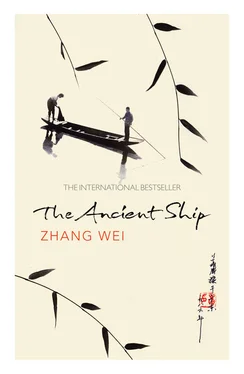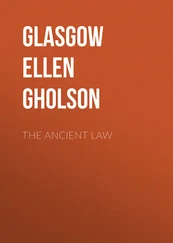A tiny, three-room hut with incense curling into the air produced the smell of death familiar to all the town’s residents. Several chests were piled up to form a sort of pulpit covered by a mat and a bedsheet. Various bowls and cups vied for space with gray-yellow candles on top. The bowls were mostly filled with glass noodles dyed in a variety of colors, topped with slices of egg-filled pancakes and decorated with lush green cilantro. Behind were photographs of the only person qualified to enjoy the offering. The photos, all of them small, were fitted into a large frame. The one in the middle, in red and yellow, had been taken six months after Dahu left home. Dressed in an army uniform, he struck a handsome, commanding pose, which had drawn the admiration of nearly every girl in town. Under the flickering candlelight, old folks leaned on their canes and bent forward to examine the photo.
At midnight Zhang-Wang came over with a stack of coarse yellow paper and a bundle of incense sticks, which she handed to the old woman, who then told her young son to record the items in pencil. With a solemn look, Zhang-Wang mumbled something before taking a twig from the old woman to draw an oval shape on the ground. She burned the yellow paper in the middle of the oval. Still mumbling, she sprinkled liquor around the flames; a few drops fell on the fire, which leaped up suddenly. The smoke got thicker, making people cough and tear up. Zhang-Wang sat down on the largest rush mat, her eyes downcast, her sleeves and her shoulders drooping. Her dusty neck was slender but strong, and with her chin pressed inward, she began to chant in a low voice like the whir of a spinning wheel. The people around her began to sway to the rhythm of her chants, the range of their movements widening as they went along, as if they had been dumped into a giant washbasin and were being stirred rhythmically. That went on till daybreak; Zhang-Wang never wavered in her chanting, but some of the people fell asleep and slumped to the ground. The old folks held on to their canes with both hands, their heads drooping down between their legs, their purplish mouths hanging slack. Some of them dreamed they were in the old temple listening to monks reciting sutras; they barely managed to escape when the temple caught fire. It was daylight when they finally woke up. The windows were red from the morning sun and the candles had burned down. Zhang-Wang rose from the rush mat to leave but was stopped by the old woman and her son, who held tightly to Zhang-Wang’s sleeve. Mother and son let her go only after she told them what they wanted to hear.
The Sui clan moved to the yard in front of the hut when the sun was high in the sky and set up a rush tent. They placed a vermillion table and chairs inside and set the table with tea servings. It was late in the afternoon when all was ready, and Zhang-Wang brought in five or six strangers with musical instruments; they sat wordlessly at the table. Then, at a silent signal, they picked up their instruments and began to play. And that was the cue for Zhang-Wang to enter the tent, where she sat on a rush mat that was spread out on the ground. The music was indescribably moving; there were people in town who had never heard ancient music like that before, and others who had a vague recollection of hearing it in the past. People streamed over, crowding the tent until latecomers were forced to stand outside. The noodle factory was virtually empty; when Duoduo came over to find his workers, even he was captivated by the music.
The musicians, whose sallow faces were unfamiliar to the townspeople, had exhausted their emotions over a lifetime of playing and now performed their mournful songs with expressions that revealed no emotion. One of them, who seemed not terribly bright, was barely holding on to his instrument and playing nearly inaudible sounds, calm and unhurried. People sat on the ground, their eyes closed as they listened intently, feeling as if they had been transported, trancelike, to a mystical land of wonder. When the musicians stopped to rest and drink a cup of tea, the listeners, near and far, exhaled loudly. At that moment it dawned on someone to ask who had invited this musical group, and they were told that Zhang-Wang had made the arrangements. That surprised no one. A moment later the music started up again and the people once more held their breath and narrowed their eyes. But then a shrill noise cut through the music. All eyes popped open to search out the source. The music stopped.
Someone spotted Gimpy, who had slipped in among the others and was sitting tearfully on the doorsill. He had taken out his flute. Angered by his presence, they told him to leave, but he began to play his flute, undeterred even when someone in the crowd kicked him. Erhuai, the pier guard, walked up with his rifle and threatened to snap the flute in two. But Gimpy held on to it for dear life, rolling on the ground to protect his treasured instrument; finally, he managed to run off.
The musicians played till late into the night, when everyone’s hair was wet with dew; moisture on the stringed instruments altered their sound until they seemed to be sobbing. Then the shrill sound of a flute came on the wind from the floodplain, each note like a knife to the heart. There is nothing quite like the sound of a flute at night, and the full extent of its mystical power was felt by the townspeople that night. The sound was mistaken by some for a woman singing or a man sobbing, boundless joy pierced through with limitless sadness. The tune was as cold as autumn ice, constantly rising and falling like a barrage of arrows in flight. When and why had Gimpy decided to play the flute like that? No one knew. But the music quickly immersed the people in thoughts of their own suffering and their own pleasures. They were reminded of how Dahu had gone down to the river as a boy, naked, to spear fish, and how he had walked around tooting on a green flute he’d fashioned from a green castor bean plant. Once he’d climbed an apricot tree and tasted some of the sap, mistakenly assuming it would be much like one of Zhang-Wang’s sweets. As shrill notes from the flute continued to drift over, the people conjured up an image of Dahu lying on the ground in his tattered uniform, his forehead ashen white, blood seeping from the corner of his mouth. The musicians in the tent began to sigh; one by one, they laid down their instruments and, like everyone else, listened intently to the flute. And so it went until the music stopped as abruptly as it had begun. The sense of disappointment was palpable as people looked around helplessly. Stars hung low in the clear, bright night sky as the dew settled. Erhuai, still carrying his rifle, came running over, stepping on people as he went to clear a passage. Everyone turned to look.
“Fourth Master!” they shouted in unison.
A man in his fifties or sixties walked slowly up a path that had been opened for him, casting glances all around from his glimmering dark eyes. Then he lowered his eyelids and looked only at the ground. His shaved head and beardless face glinted in the starlight. His neck was fleshy, the skin moist and ruddy. Thick around the middle, he stood straight when he walked; his reddish-brown jacket was ringed at the waist by a stiff leather belt. He wore a somber look that day; his eyebrows twitched. And yet his face emanated kindness and gentleness, even with his mouth tightly shut, which both consoled people and filled them with resolve. The clothes he wore were handmade, with close stitching and neatly placed buttons, the sleeves cut to show off his powerful shoulders and upper arms. He had large hips that moved easily as he approached the tent. Not until that moment had anyone noticed that the street director, Luan Chunji, and Party Secretary Li Yuming were behind Fourth Master, who stood at the opening to the tent and coughed softly. The musicians, who sat impassively when they were working, now stood up and bowed, forcing smiles onto their faces. Without a word, Fourth Master signaled for them to sit down. Then he bent slightly at the waist and poured each of the musicians a cup of cold tea before turning and walking over to the hut.
Читать дальше












